How a week of fires changed the city of Los Angeles
A tour of the devastated areas reveals the destruction that the Eaton and Palisades blazes left in their wake
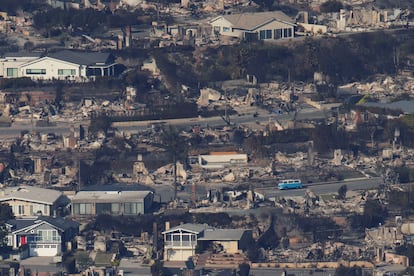
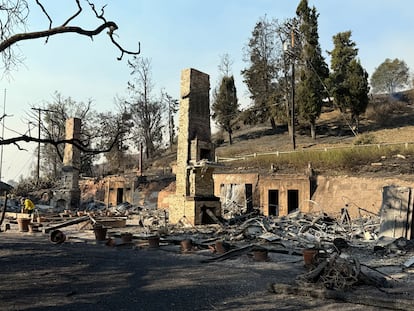
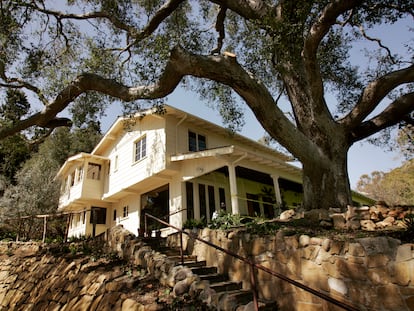
California had been preparing for disaster for years. Authorities had predicted that it would be caused by an earthquake, but it was a series of fires that changed the face of Los Angeles, the state’s main city. The blazes destroyed over 12,000 structures in one week. Residences, businesses, places of worship, and historic monuments to the east and west of the iconic city have ceased to exist. The most conservative estimates, although still preliminary, put the amount of damage at around $25 billion.
There are some losses that cannot be recovered. Take the ranch of Will Rogers, a turn-of-the-last-century celebrity who became a keen commentator on American politics. Rogers wrote thousands of columns for national newspapers between 1916 and 1935, when he died in a plane crash in Alaska. His lavish estate was donated to the state by his widow in 1944. For decades, it has been one of the most visited public parks west of Los Angeles. His 31-room ranch house was converted into a museum and housed his collection. The residence was burned to the ground in the Palisades Fire. Several items from Rogers’ life, his political cartoons and cowboy accessories, were saved. The Will Rogers Foundation is calling for donations to support the park rangers.
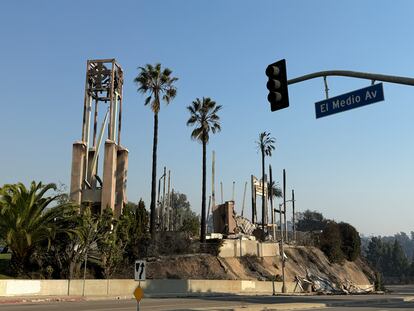
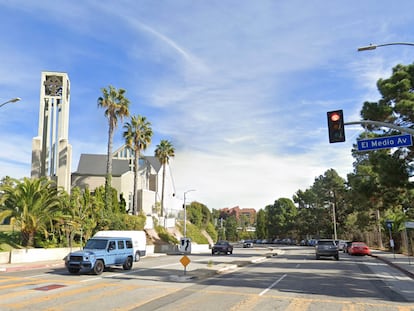
Sunset Boulevard, one of the most emblematic avenues in Los Angeles, has been severely damaged by the Palisades Fire that devastated the west side of the city. At the intersection of this artery with El Medio there are two churches. On one side of El Medio there is a Lutheran church, that suffered hardly any damage. On the east sidewalk there is a Presbyterian church, almost completely destroyed. This temple was built in 1957 on a property that was owned by Congressman Leland Ford, a legislator who publicly supported sending Japanese residents in the United States to concentration camps during World War II. Those in charge of the Pacific Palisades church have indicated that all employees evacuated safely, although they lament the destruction of their facilities. “Many in our congregation have suffered enormous losses, so we appreciate your prayers,” says the organization, which is also receiving donations to help with reconstruction.
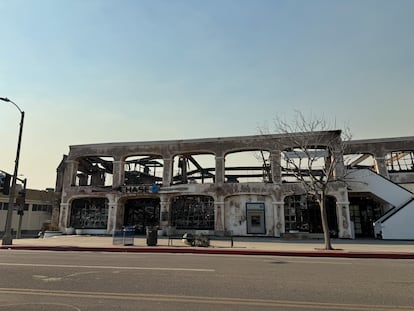

Companies have begun to allocate aid for the emergency. Netflix and Comcast, the parent company of NBC, announced Monday that they have each donated $10 million to the Los Angeles Fire Department Foundation, the Red Cross, and World Central Kitchen, headed by Spanish-American chef José Andrés. These large donations are in addition to that of Disney, which on Saturday announced $15 million for a reconstruction fund. Fox has donated $1 million. Bank of America and JP Morgan Chase have announced that they will allow customers who have lost their homes to pause mortgage payments for up to a year, or reduce monthly payments. The image above shows a Chase branch in Pacific Palisades.

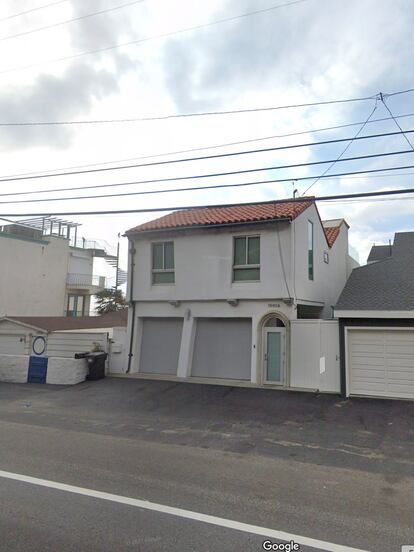
The Pacific Coast Highway, a long scenic road that connects San Diego to San Francisco, is now miles and miles of ruins and ash as it passes north of Santa Monica. This house once stood there, with now only the door frame remaining. Several Malibu restaurants that were part of the region’s culinary scene have also been devoured by the flames. Gladstones, Moonshadows, Reel Inn, and Cholada, to name just a few, are gone. The owners of these businesses are studying how to recover from the tragedy. To alleviate the situation, the state government has decreed a tax moratorium that will allow them to delay the payment of taxes that were due this month for a period of nine months.
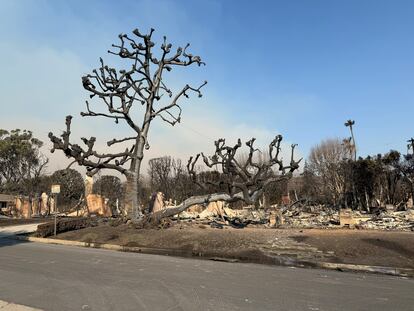
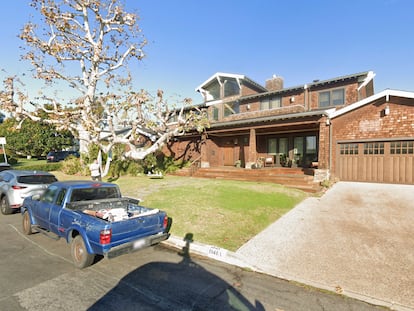
The unstoppable advance of the fires has once again brought back the debate on construction in California. Fire consumed thousands of wooden structures in a week, a material widely used due to its abundance and low cost. In 2019, 90% of houses built had wooden foundations. This material is also preferred because construction times are shorter than with concrete houses. On average, a wooden house can be built in between 12 and 14 weeks. Brick houses, such as the one shown in the photograph, also succumbed to the extreme conditions caused by the strong Santa Ana winds.
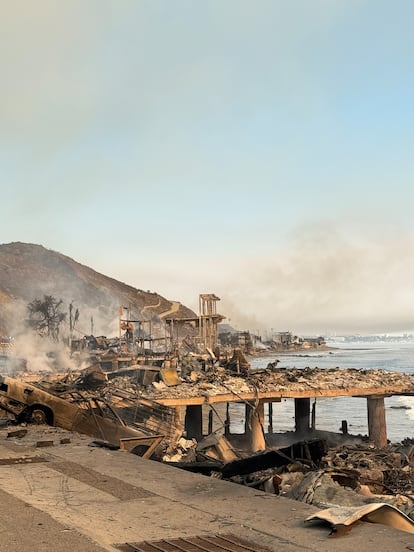
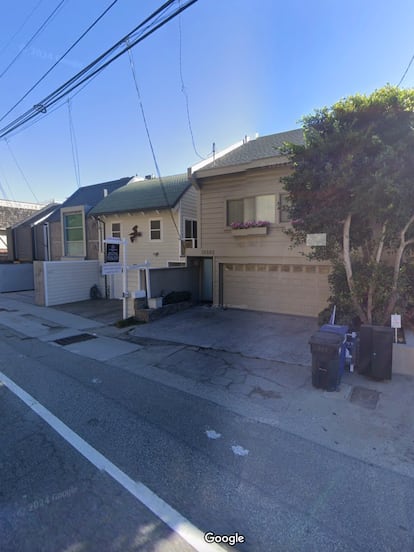
The Malibu landscape will never be the same after the Palisades Fire, which has razed 9,500 hectares and whose advance had been halted by Monday, despite only registering 14% containment. The blaze, which began on Tuesday of last week, was especially cruel to this emblematic part of the Pacific coast. A third of the area has been damaged. The fire destroyed 12 adjacent houses on the strip of land that can be seen in the photograph. The residences represented the most elegant Los Angeles lifestyle: at the foot of a beach with beautiful views frequented by surfers. That has now been reduced to ashes. The sports cars that were in the garages are now scrap metal. The chimney is the only thing left standing in many of the mansions in the area.
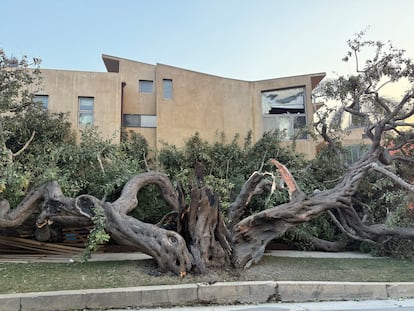
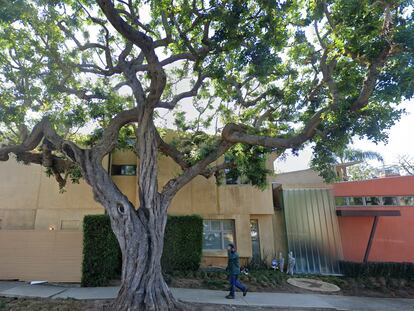
This tree caught the eye on a tour of the eastern section of the Pacific Palisades, known as the Alphabet section. It was a residential neighborhood populated mostly by the middle class. The price of the lots started at $1 million, a figure that made the neighborhood more affordable compared to other more exclusive areas of Palisades. It was a popular place for young families. The Alphabet section had shops and businesses nearby, within walking distance. The neighborhood was located on a practically flat area. This caused the flames to jump from one house to the next, barely stopping, and leaving few buildings standing.
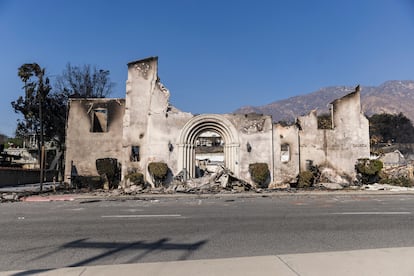
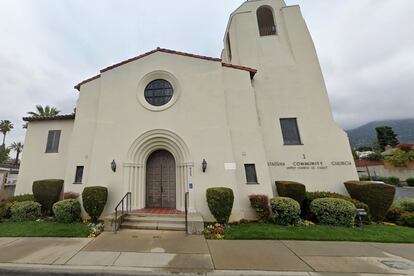
Many of the victims have not only lost their homes. The fire has also taken places of community service. This is the case of this Altadena church. For 78 years, it has served a wealthy population made up of Latino, Black, and white residents. Its congregation has shown the strength of its ties in these tragic days and met Sunday at an alternate location in Montebello. “Our church will always meet, until it is impossible to continue. A fire will not stop us,” Carl Whidden, the husband of the church’s pastor, Paul Tellström, who had recently announced his retirement due to suffering from Parkinson’s, told The Los Angeles Times.
The photo below is of a typical Altadena residence, a simple, one-story, wooden construction. This house on McNally Avenue is surprising because the structure built in the backyard carries little damage. The main house, however, disappeared in the flames of Eaton.
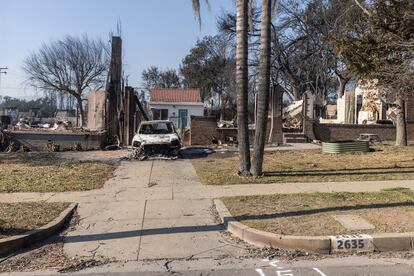
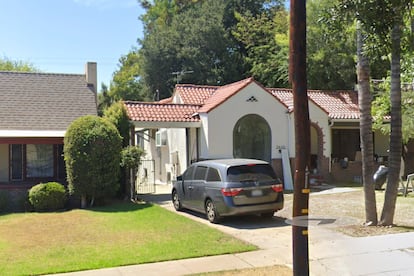
Sign up for our weekly newsletter to get more English-language news coverage from EL PAÍS USA Edition
Tu suscripción se está usando en otro dispositivo
¿Quieres añadir otro usuario a tu suscripción?
Si continúas leyendo en este dispositivo, no se podrá leer en el otro.
FlechaTu suscripción se está usando en otro dispositivo y solo puedes acceder a EL PAÍS desde un dispositivo a la vez.
Si quieres compartir tu cuenta, cambia tu suscripción a la modalidad Premium, así podrás añadir otro usuario. Cada uno accederá con su propia cuenta de email, lo que os permitirá personalizar vuestra experiencia en EL PAÍS.
¿Tienes una suscripción de empresa? Accede aquí para contratar más cuentas.
En el caso de no saber quién está usando tu cuenta, te recomendamos cambiar tu contraseña aquí.
Si decides continuar compartiendo tu cuenta, este mensaje se mostrará en tu dispositivo y en el de la otra persona que está usando tu cuenta de forma indefinida, afectando a tu experiencia de lectura. Puedes consultar aquí los términos y condiciones de la suscripción digital.








































